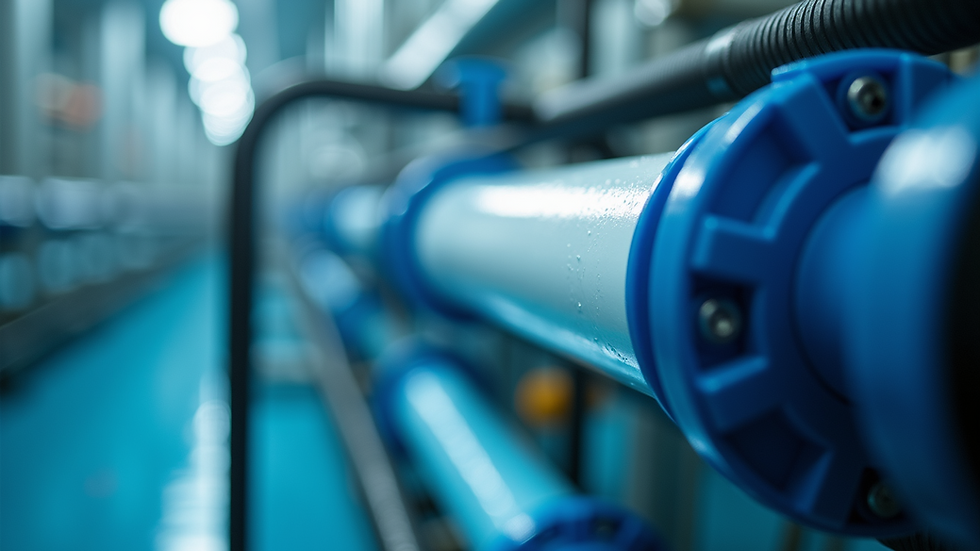Understanding Limescale: The Hidden Threat in Yachting
- Niv Gilad

- May 3, 2025
- 3 min read
Updated: Jun 10, 2025
What Is Limescale? (And Why It’s the Stowaway You Didn’t Invite)
Ever noticed cloudy spots on your sink or a kettle that makes more noise than it should? That’s limescale at work. It forms when hard water—a type of water rich in minerals—gets heated or sits in pipes. Over time, those minerals crystallize and build up on internal surfaces.
At home, it’s annoying. On a yacht, it can be a budget-draining maintenance issue. Reduced flow, higher fuel consumption, or worse, an unexpected breakdown in the middle of a trip, are all part of limescale’s silent sabotage. Sound familiar?
Spot the Stowaway: Is Limescale Sneaking Around Your Yacht?
Here are some signs to watch for:
Weak Water Pressure: Your once-powerful shower now feels like a mist.
Spotty Fixtures: White stains on taps, glass, and tiles that just won’t go away.
Grumpy Appliances: Coffee machines and water heaters making strange noises or taking longer to work.
Constant Cleaning: You’re descaling more often than docking.
Rising Energy Bills: Your systems are working harder, and it shows.
Letting It Slide? Here’s What It’ll Cost You
Let’s be honest: no one wants to deal with maintenance while cruising the Med. But limescale doesn’t wait. It chips away at performance and profits.
Skyrocketing Maintenance: More parts, endless service calls, and escalating costs.
Equipment Burnout: Your water heater was supposed to last 10 years; it’s barely made it five.
Unplanned Downtime: Trips are disrupted, guests are unhappy, and crew become frustrated.
Not-So-Fresh Water: Even if it’s safe to drink, does it taste like it?

Captain’s Orders: Time to Fight Back
The good news is that there are tried-and-true ways to stop limescale in its tracks. Prevention is key, and modern options are more eco-friendly than ever. Here’s what works:
1. Reverse Osmosis Solutions
These are the front-line defense. Small, smart, and simple to install, these devices utilize membranes to filter out impurities from water. No chemicals, no fuss.
2. Marine Water Softeners
By using a tank filled with small beads of resin, hard water undergoes ionization, which extracts the metals and reduces calc deposits.
3. Routine Flushing
Regularly flushing your system helps wash away loose minerals before they cling on for dear life. This practice is especially important after long periods of inactivity.
4. Check Before You Fill
Not all dock water is created equal. Test water hardness at each port and use that information to adjust your onboard system accordingly.
Smooth Sailing: A Smarter Way to Yacht
Imagine a yacht where the water pressure never fades, the taps always sparkle, and the systems run like clockwork. Today’s integrated water treatment systems—combining softening, filtration, and real-time monitoring—make that dream a reality. They’re getting smarter, sleeker, and easier to install every year.
Whether you’re commissioning a new build or retrofitting a trusted vessel, addressing limescale early means fewer surprises and more smooth sailing.
Not Just Pipes: Why This Matters for You and the Planet
Keeping limescale at bay isn’t just about convenience—it’s about sustainability. Efficient systems use less energy. Preventing breakdowns means fewer parts end up in landfills. Plus, reducing chemical cleaners supports healthier oceans.
By treating water responsibly, you’re not only improving life onboard—you’re making a conscious choice to protect the waters you love to explore.
In conclusion, paying attention to limescale and taking proactive measures can lead to a more enjoyable yachting experience. It's crucial that we remain vigilant against this hidden threat. After all, it’s not just about your yacht’s performance; it’s about ensuring that your adventures on the water are as refreshing as the ocean breeze itself.
Whether you're new to yachting or a seasoned sailor, keeping an eye on limescale could save you time, money, and unnecessary frustration. Equip your yacht with the right tools and knowledge, and you’ll be ready to navigate the open waters without worry.





